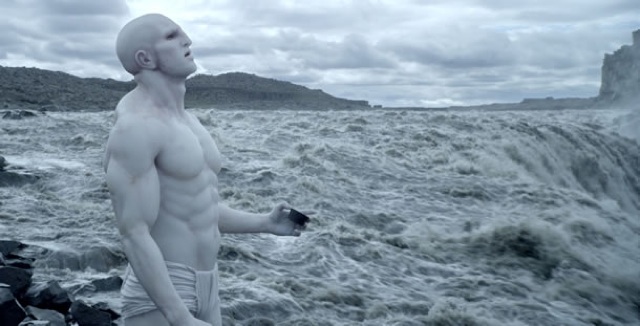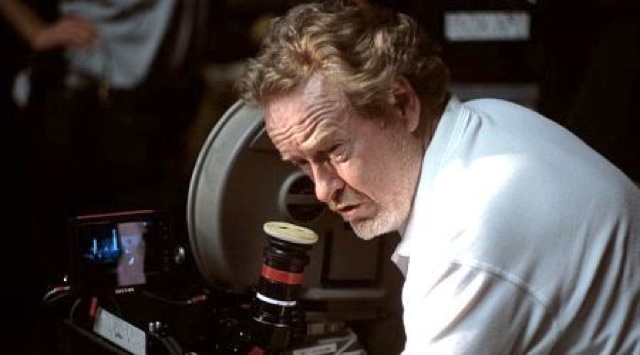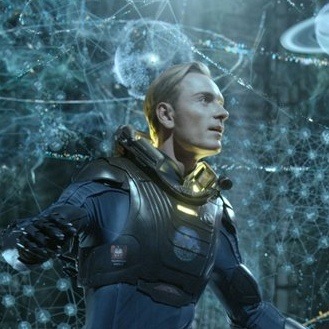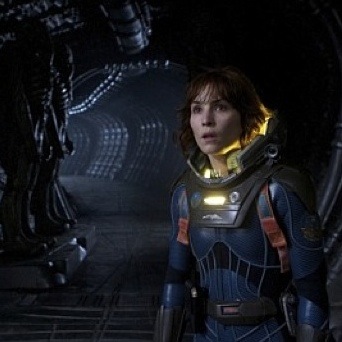Ridley Scott’s 1979 Alien was the most ingenious fright show of its era and the source of spinoffs upon spinoffs. Although his new film Prometheus is something of a prequel to Alien, the elements of body-invading and body-devouring horror that Alien orchestrated with such precision are here made to figure in a narrative of more grandiose ambitions, extending as far as the source and ultimate purpose of human life. That is not meant as a criticism. Grandiosity is as essential to this genre as to a verse drama by Victor Hugo or an opera by Meyerbeer. Just as essential is the herding together of stock elements from previous ventures, as if one could not go beyond one’s predecessors without literally incorporating their materials.
But what is this genre? Call it the speculative science fiction epic willing to flirt with cosmic pessimism; the eternally recurring saga of the space voyage toward our point of origin or ultimate destiny (they generally turn out to be pretty much identical); the drama of metamorphosis in which animals become human and humans become machines; the proleptic chronicle of a future depicted as so endangered it may not even come to pass, and so unappealing we might well wish it wouldn’t. This in its various cinematic permutations constitutes our theater of dread, cunningly disguised as a game; our stab at a commercially viable form of Wagnerian sublimity: The Twilight of the Humans, an existential cosmic opera-in-progress sketched out in the 1950s in Forbidden Planet and the BBC television serial Quatermass and the Pit, ennobled by Kubrick’s 2001: A Space Odyssey and Tarkovsky’s Solaris, and continually reconfigured ever since. Every attempt to exhaust the form simply engenders more offshoots, much like the alien life-forms that proliferate in the black corridors of Prometheus.
There is of course a written literature that predates and underlies all these movies, which could hardly have found their form without the help of H.P. Lovecraft and Arthur C. Clarke and Philip K. Dick (not to mention the foundational assistance of H.G. Wells and Olaf Stapledon). There is even an epic poem, Harry Martinson’s Aniara, an absurdist vision of life aboard a rocket ship permanently lost in space, that in 1958 was turned into a twelve-tone opera by Karl-Birger Blomdahl. But it is in the form of movies that this mythology becomes part of the furniture of our world, to which we turn as one might to a prayer rug or a Ouija board, in an effort to make contact with the unknowable.
It’s where the Romantic Sublime went to die, as Scott establishes with the series of exquisitely abstracted fragments of Icelandic landscape that start the proceedings. Into those cascading northern waters—what better archetype, or stereotype, of purity could be found than that?—a bleached and gigantic outer space visitor (his saucer hovers in the air above the fjord) will presently set loose primal strands of alien DNA, by the Osiris-like method of exploding his body into a thousand fragments. Sure enough, in the next scene, on the Isle of Skye, we find ourselves in the company of a pair of late-twenty-first-century archaeologists as they uncover ancient wall-paintings that unmistakably gesture toward a distant point in space. The coupling of extraterrestrial visits and archaic civilizations, dear to pseudoscience, gives birth to the film proper: a journey, via spaceship Prometheus, to a far planet in search of the race of “engineers” who may have created us.
Ever since Lovecraft, archaeology has been an indispensable point of entry to the remotest reaches of the universe, and the space voyagers of Prometheus will travel to those reaches only to find echoes of earthly mythology, whether horrendous serpents recalling the fate of Laocoön or titanic forebears proportioned on the order of Gilgamesh. Ridley Scott, who at his worst can seem merely a superb illustrator, at his best (as he is in much of Prometheus) can really do the romantic sublime. He continually suggests more than the movie’s plot and dialogue can quite live up to, and when he wants he can deliver a boreal blast of the “magnificent desolation” that Buzz Aldrin caught sight of when landing on the Moon.
Once on shipboard everything falls into generic line, with passengers woken from cryogenic sleep by an all-monitoring android, hints of malevolent corporate control—the space journey has been funded by an elderly billionaire CEO (Guy Pearce in mummifying makeup), with Charlize Theron doing a near-parodic turn as the definitively icy mission director—and the gradual revelation of the mission’s true purpose. The ship is of course a showcase of technological miracles, from the monitors that enable the android David (a movie-stealing Michael Fassbender) to watch the sleepers’ dreams as a collage of pixilated superimpositions to the 3D holograms that provide a responsive map of the unknown planet on which the voyagers have landed.
Advertisement
This time around we get to watch the 3D holograms in 3D, bringing us close to a participatory experience. Futuristic movies have always been high-tech showcases—everything must at least strive to look newer than the last time—and now more than ever their true subject seems the materials with which they are made. Questions about the nature of the human are posed by means that put that nature into question. We approach the moment of movies about androids that are made if not by androids then at least with their indispensable assistance. (Of course, even in 2096, when humans can manufacture androids capable of instantly deciphering extraterrestrial inscriptions and can administer advanced surgery to themselves in five minutes or so, they still rely on the same old inadequate flashlights to explore dark winding caves.)
The android steals the show because he is a good deal more lifelike than the ostensible humans. Always ready to provide the dry wit for which androids are known and repeatedly watching Lawrence of Arabia in order to model himself on Peter O’Toole, David is there to represent a future that is of a piece with the technology with which the film is made. That his personality is constructed out of bits from an old movie certainly doesn’t differentiate him in principle from the other characters, who are serviceable types decked out with necessary plot points. The ship’s captain (Idris Elba) plays a concertina and reminisces about old rock records to show that he’s possessed of authentic human warmth; the female archaeologist (Noomi Rapace) wears a cross around her neck in order to bring the “question” of religion into the picture without actually having to discuss it—and perhaps also to prepare us for the bloody near-martyrdom she will undergo in the film’s horrific centerpiece.
The elements that dominate in the film’s first hour—the displays of technological wonders, the comparative charts of ancient astronomical imagery, the android with his limitless powers of analysis and extrapolation, and the inevitably truncated conversations about religion and Darwinism—are meant to suggest an atmosphere of intellectual voyaging, as if we were here to find the solution to a puzzle. From the halfway point on, we tip rapidly into grand guignol country, with an accelerating number of variations on the human body made monstrous by contact (external or internal) with alien life, the inevitable result of messing around in old tombs. Pseudoscientific speculation and pulp images of corporeal horror just naturally go together, and when set side by side they split the difference between “there must be something beyond all this” and “let me out of here.”
We were never really in the realm of working out logical solutions to difficult problems; what Scott and his writers are up to is throwing as many juicily irrational ingredients into the same cauldron to see what happens when they start to interact, which turns out to be the same thing that happened before: the body invaded, transmuted, tortured, split open, devoured. There are in fact a few belated lines of explanatory dialogue that suggest a reason of sorts for all the unpleasant happenings, casting Prometheus somewhat in the light of a protest against military technology. But they feel like afterthoughts, tossed away in the midst of the much more pressing concern of dealing with all that lethal proliferating alien life.
A movie like Prometheus—and that is the extraordinary power of its genre—serves as an outlet for irrational connections. It’s a form of divination, of finding what you were not necessarily looking for. The visual plotting of DNA strands and the decipherment of lost languages connects suddenly and overwhelmingly with the old motif of the Evil Pregnancy and we are back in the world of Rosemary’s Baby or The Omen. It is only momentarily surprising to find the issues of abortion politics in the middle of a cosmological quest. This is a film that dares, however implicitly, to raise the question: Is a Christian believer justified in aborting, or more precisely killing immediately after delivery, the predatory spawn of an alien race with which she was unwittingly impregnated?
By the time that question comes along we are far from the pleasures of selfless speculation. But the film’s other major set piece provides something like a visualization of such pleasures. The android David, from his deepening understanding of the lost race of engineers, discovers how to set in motion a three-dimensional star map that he can watch sitting on a dark throne: a dematerialized mental theater in the mode of what might be called digital baroque, a futuristic period piece conjuring up images of astrolabes and alembics and encircling orbs out of the old Faustian laboratory and making them new. They are so new as to barely exist yet, a promise at the glistening edge of a future about to arrive but not quite here. Then the illusion shuts off and we are alone again in an ancient mausoleum.
Advertisement
At least a few moments of such pure enjoyment were necessary to alleviate the otherwise crushing cumulative horror that is finally the ground note of Prometheus: the horror of time, of the future, of the past, of the infinite spaces within which nothing exists but what is to be feared. The likable presence of Idris Elba and his concertina is about all that anchors Prometheus to any recollection of the pleasures of earthly life, especially since the only trace of sexual tenderness in the film leads directly to embryonic horror remedied by an automated C-section. What is at issue, it seems, is not the horror of alien life but of life in any form; not the existence of monsters but the monstrousness of existing. The dread that rises to the surface here hints at a culture variously afraid of sex, afraid of Darwin, afraid of DNA, afraid of aliens—afraid no matter which way it looks, forward or backward—and finding its way at last, as a last resort, to a planet of death. After that, the only destination left is The Great Unknown: or more precisely (and perhaps we have this to look forward to as a sequel) the home planet of the Manichaean demiurges who engineered us randomly and then just as randomly set out to eradicate us.






